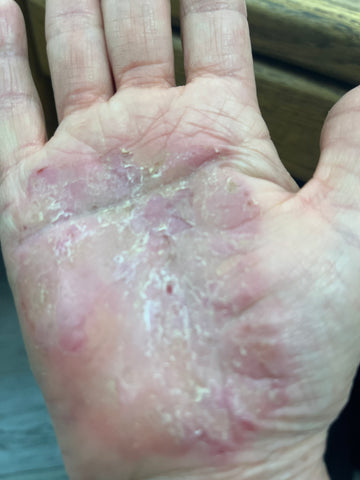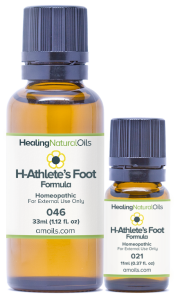Athletes Foot Pictures
Home > Image Gallery
Pictures showing athletes foot
Checking out Athlete's Foot pictures will help you to recognize the difference between this condition and other foot problems such as plantar's warts, corns and bunions. Athlete's foot is a very common fungal infection that grows on human skin but especially the feet. It mostly affects men of all ages and appears in the area between the toes, on the soles of the feet as well as in the fingernails and toenails. This infection, once it takes hold, grows and multiplies particularly in a dark, moist and warm environment. Athlete’s foot is very contagious and may easily be picked up when walking barefoot in public places.
Athlete's foot images clearly show cracked, blistered or peeling areas often between the toes and especially the two smaller toes where the rash starts to peel and crack. Other images will show redness and scaling on the soles of the feet plus where a rash spreads to the instep. Sometimes blisters occur. At other times there are single, small patches of extremely itchy blisters.
What Does Athletes Foot Look Like?
If it is clear from the athlete's foot photos that you too have athlete’s foot, then treat the condition as early as possible and try not to scratch when the itching starts. It is very important with athlete’s foot to continue any treatment to the end of the course – that is at least two weeks after the skin starts to look normal - to eradicate all the remaining fungal spores. It is also important to keep those feet dry because damp breeds bacteria and bacteria causes rot. Bacteria and fungus love to grow in warm, damp, dark places like sweaty shoes.
When you have compared your own foot condition to our gallery of images of athlete's foot, you will be able to go ahead and start treatment as quickly as possible.
Have Athlete's Foot? Our athletes foot product may be able to help you - H-Athletes Foot
|
Athletes foot |
Athletes foot fungus |
Athletes foot infection |
|
Athletes foot on fingers |
Athletes foot on heels |
Severe athletes foot |
Understanding Athletes Foot Healing Stages
Visual aids can help identify and understand athlete's foot. Various stages show different symptoms and severity levels. Examining these pictures will clarify what to expect and how to track healing.
-
Early Stage
-
Redness and Itching: The first stage often involves redness and mild itching.
-
Flaky Skin: You might see dry, flaky skin resembling dandruff.
-
Intermediate Stage
-
Blisters and Cracking: As the condition progresses, small blisters may appear. Cracking between toes is common.
-
Increased Itching: Itching becomes more persistent and intense.
-
Advanced Stage
-
Severe Cracking and Peeling: Skin may peel off in layers, exposing raw tissue underneath.
-
Possible Infection: Without treatment, secondary bacterial infections can develop, leading to pus and swelling.
-
Healing Stage
-
Reduced Redness and Itching: Symptoms gradually lessen with proper treatment.
-
Skin Regeneration: New, healthy skin begins to form, replacing damaged areas.
Remarkable improvements are observable with consistent application of anti-fungal treatments. Always consult a healthcare provider for accurate diagnosis and tailored treatment.
Customer Submitted Severe Athlete's Foot Pictures
Customer-submitted pictures help visualize the severity and progression of athlete's foot. These images showcase real-life examples of how the condition can affect your feet at different stages.
Advanced Stage Picture
In the advanced stage, you'll notice severe cracking and peeling skin. Open wounds and inflammation are common, signaling a serious need for treatment. If untreated, secondary infections can develop, complicating the healing process.
Intermediate Stage Picture
Pictures from the intermediate stage reveal small blisters and pronounced cracking between the toes. The skin appears red and irritated, with visible signs of increased itching. These images underline the importance of early intervention to prevent progression.
Early Stage Picture
Early-stage pictures show mild redness and flaky skin. While discomfort and itching are present, they are less severe. These images highlight the initial signs that, if detected early, can be effectively managed with proper care.
Healing Stage Picture
Healing stage pictures display the positive outcomes of consistent treatment. New, healthy skin replaces the damaged areas. Redness and itching reduce significantly, indicating recovery. These images emphasize the effectiveness of anti-fungal treatments in managing athlete's foot.
These customer-submitted pictures provide invaluable insights into the stages of athlete's foot. Identifying the condition early and starting treatment can lead to quicker recovery and less discomfort.




Information on Health Conditions
Understanding the healing stages of athlete's foot can make a big difference in your recovery journey. By recognizing the early signs and symptoms, you can take prompt action to prevent the condition from worsening. Visual aids and customer-submitted pictures provide a clear view of what to expect at each stage, helping you stay informed and proactive.
Consistent use of anti-fungal treatments and consulting a healthcare provider are key steps in managing and overcoming athlete's foot. With patience and proper care, you'll see remarkable improvements and enjoy healthier, itch-free skin. Stay vigilant and take control of your foot health for a more comfortable and confident life.
Frequently Asked Questions
How to identify the early stages of athlete's foot?
The early stage of athlete's foot is characterized by redness, mild itching, and flaky skin, primarily between the toes. Recognizing these initial signs can help you manage the condition effectively.
What happens during the intermediate stage of athlete's foot?
In the intermediate stage, small blisters and cracking between the toes occur, accompanied by increased itching. Early intervention at this stage can prevent the condition from worsening.
What are the symptoms of advanced athlete's foot?
The advanced stage features severe cracking and peeling of the skin, which can lead to possible infections if left untreated. Immediate treatment is crucial to avoid complications.
How can you tell if athlete's foot is healing?
During the healing stage, you should notice reduced redness and itching, with new, healthy skin forming. Consistent application of anti-fungal treatments is key to recovery.
Should you moisturize athlete's foot?
Avoid using moisturizers between your toes as they can exacerbate the condition. Instead, dab your feet dry gently and avoid powders that could irritate the skin.
Why isn’t my athlete's foot improving?
If your athlete's foot doesn’t improve within a week of treatment, consult a healthcare provider. Fungal infections can develop resistance to treatments, requiring professional diagnosis and a tailored treatment plan.
Why is early detection of athlete's foot important?
Early detection allows for prompt treatment, which can lead to quicker recovery and less discomfort. Initial intervention can prevent the condition from progressing to more severe stages.
What visual signs indicate the healing stage of athlete's foot?
Healing stage pictures usually show reduced redness and significant improvement in skin condition, with healthy skin replacing damaged areas. Consistent anti-fungal treatment typically results in these positive changes.










